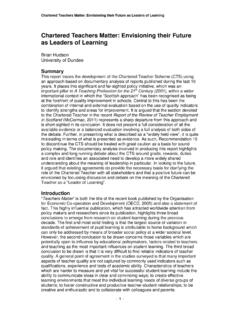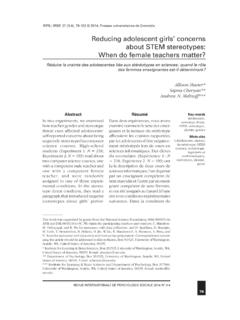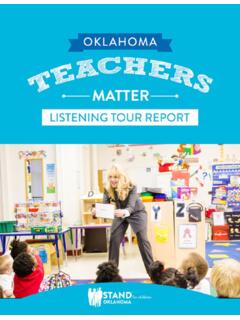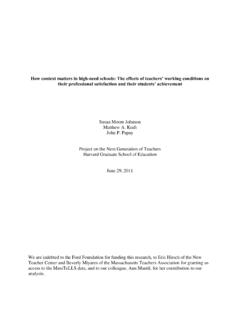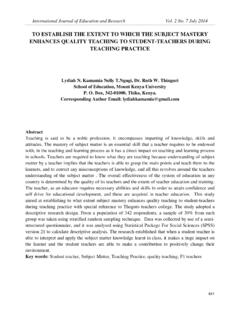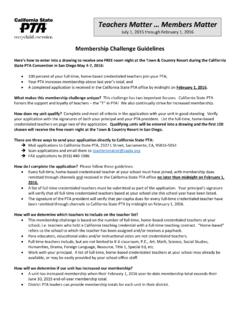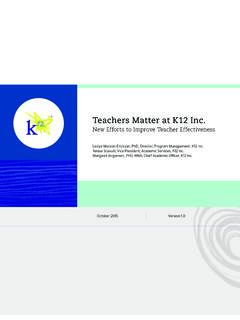Transcription of Teachers Matter: Rethinking How Public Education Recruits ...
1 Teachers matter : Rethinking How Public Education Recruits , Rewards, and Retains Great Educators A report prepared for the Business Education Alliance of Alabama by the Public Affairs Research Council of Alabama August 15, 2015 BEA Board of Directors Jeremy Arthur, President Chamber of Commerce Association of Alabama Will Brooke, Managing Partner Harbert Management Corporation Billy Canary, President & CEO Business Council of Alabama Carol Gordy, President & CEO Natural Decorations, Inc. Joe Morton, Chairman and President Business Education Alliance BEA Officers Joe Morton, Chairman and President Business Education Alliance of Alabama Jay Love, Co-Chair, Finance Business Education Alliance of Alabama BEA Advisory Council Hal Brewer, President Intuitive Research and Technology Corporation Ann Marie Corgill, teacher of the Year Cherokee Bend Elementary Gen.
2 Ed Crowell, Senior Vice President VT Miltope Frances Finney, Principal of the Year Fultondale Elementary School Blake Harris, State Director StudentsFirst John Heard, Superintendent of the Year Perry County Schools Debbie Long, Senior Vice President Protective Life Corporation Jay Love, Co-Chair, Finance Business Education Alliance Bill Lyons, President Lyons HR Joe Morton, Chairman and President Business Education Alliance Caroline Novak, President A+ Education Foundation Ray Perez, General Counsel & Division Manager Honda Manufacturing of Alabama Paul Pinyan, Executive Director Alabama Farmers Federation Ronald Rowell, Principal of the Year Theodore High School Jerry Snow, Principal of the Year Piedmont Middle School Jeff Thompson, Executive Director Alabama Aerospace Industry Association Chester Vrocher, Acting Executive Director Alabama Technology Network Donna Watts, President South Baldwin Chamber of Commerce Jim Williams, Executive Director Public Affairs Research Council of Alabama Special Acknowledgements A special thanks to our Partners.
3 Without their support this research project would not have been made possible. Each Partners' logo is included in this publication with pride and gratitude. A special thanks to Caroline Novak, President and Thomas Rains, Policy Director, A+ Education Foundation. Without their interest, support, knowledge and desire, this research project would not have been possible. Teachers matter : Rethinking How Public Education Recruits , Rewards, and Retains Great Educators TABLE OF CONTENTS Executive Summary .. 1 Recruit and Train .. 3 Review and Support .. 14 Reward and Challenge .. 21 Conclusion .. 30 1 Executive Summary The 2014 Business Education Alliance (BEA) report, Obstacles into Opportunities, described the potential impact of achieving Alabama s goal of graduating 90 percent of students from high school prepared for college and career.
4 This year s report focuses on the professionals most essential to reaching our goal: Teachers . We ve challenged schools to deliver an Education that is internationally competitive in its quality and depth. The state has adopted new metrics and new assessments to measure progress toward its ambitious educational goals. We have devised strategies to reach our goals and are making investments to support those strategies. Based on the Obstacles into Opportunities Report, the BEA identified key funding elements critical to success, and the Alabama Legislature funded $ million in new dollars in the 2016 Education Budget to address those needs. But the entire endeavor depends on talented Teachers . Bright Teachers recruited to the profession to address needs in key fields, like math and science, and in hard-to-staff schools.
5 Teachers who are rigorously prepared in college and supported in their transition to the classroom. Veteran Teachers challenged to continuously improve their teaching. Teachers given opportunities for professional advancement and tangible rewards. Research has confirmed over and over that the single most important school-related factor associated with students success is their teacher s effectiveness. According to research cited in Endangering Prosperity: A Global View of the American School1: Top Teachers can produce gains of grade levels, while the bottom Teachers produce gains of only half a grade level in an academic year. Three to five years in a class with a top teacher , rather than an average teacher , is sufficient to erase the average achievement gap between poor and better-off children. teacher quality matters.
6 Prior to the Great Recession of recent years, Alabama policy makers had put considerable study and planning into a variety of efforts aimed at improving teacher quality. Some of these initiatives were set aside in light of severely constrained budgets. Others continued in the background and are only now coming to fruition. As budgets recover, it is time to refocus attention on teacher quality and invest in initiatives that benefit students by improving the instruction they receive. These initiatives can be described in terms of three imperatives: 1. Recruit and Train: Alabama should have higher standards for admission to, and a higher bar for graduation from, teacher prep programs. Alabama colleges and universities that train new candidates for the field must develop strong partnerships with local school 1 Hanushek, Eric A.
7 ; Peterson, Paul E.; Woessmann, Ludger (2013-06-28). Endangering Prosperity: A Global View of the American School (Kindle Locations 1208-1216). Brookings Institution Press. Kindle Edition. 2 systems that benefit both parties. Financial incentives should be put in place for Teachers who ll commit to working in hard-to-staff schools or high-need fields. 2. Review and Support: By fall 2018, Alabama school systems should have a teacher effectiveness evaluation system in place. For the first time, these evaluations will include student test performance data as a measure. A well-designed evaluation system encourages teacher growth and, ultimately, can inform employment and tenure decisions. Evaluations must be accompanied by support, support for Teachers in their entry into the profession and continuing support for Teachers who want to improve their effectiveness.
8 3. Reward and Challenge: To encourage a culture of continuous improvement in teaching quality, Alabama should develop pathways for Teachers to grow professionally while remaining in teaching roles and create financial incentives for schools that achieve improved or high-level student results. These imperatives can be implemented with modest investments that will pay great dividends. The programs required have been developed and in some cases already implemented in parts of Alabama, but not yet statewide. To attract top students and encourage them to teach where they are needed most, the Legislature should consider reviving and revising the Alabama teacher Recruitment Incentives Program (ATRIP) with a projected investment of $3 million annually. A pool for scholarships and incentives is vital to addressing teacher shortages, especially considering the essential importance of science, math and technology to the 21st Century Economy.
9 To promote the success of new Teachers entering the field, the Legislature should renew support for the Alabama teacher Mentoring Program (ATMP), an estimated $4 million annual investment. While it operated, ATMP paired carefully selected veteran Teachers with beginning Teachers , providing a $1,000 stipend for mentors to support counseling and coaching throughout the school year to new Teachers . To recognize great Teachers and magnify their impact, the Legislature should sponsor the development of new teaching roles to allow for career growth within teaching. An appropriation of $600,000 could sponsor pilot programs to give the best Teachers the ability to reach more students and help their fellow Teachers improve. To encourage school faculties to work together toward improving student outcomes, the Legislature should renew its support for financial bonuses to schools that show high levels of improvement or sustained success in student achievement.
10 An appropriation of $ million would allow for reinstatement of the Exceeding the Challenge awards for the top 10 percent of Alabama s K-12 schools in improvement or achievement on state assessments. Bottom Line: Teachers represent the state s largest and most important educational investment. Investments to encourage greater teaching quality underline the fundamental fact that Teachers matter . 3 Recruit and Train The Best Teachers Where They are Most Needed We are setting higher standards for our students. We are asking more from our Teachers . Alabama s teacher preparation programs must ensure that they graduate teacher candidates who are talented, well-trained, and prepared to adapt and change throughout their careers in Alabama s Public schools. We also must encourage more Teachers to teach where they are needed most: in high-demand fields like math, science, and special Education and in hard-to-staff schools, which are frequently the schools where students are struggling and great Teachers can make the biggest difference.

